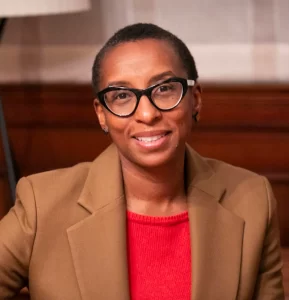January 9, 2023
When Claudine Gay resigned as President of Harvard last week the gloating by some conservative activists and commentators was unappealing to put it mildly. Their unseemly glee seemed vindictive and disproportionate. It said more about them and their agenda than it did about Dr. Gay and the dysfunction at Harvard. When Gay did herself few favors with her NYTimes guest essay — in which she took little responsibility for her fall from grace — it just fueled their fire.
Oceans of print and pixels have now been expended by those weighing in on what all this does and doesn’t mean. There’s not much I can add except to wonder why Gay, like the two other university presidents, was not equal to the moment. That, and the unfortunate circumstance of a storied institution beholden to a new-fangled ideology.

Here was an accomplished administrator and brilliant scholar floundering in a Congressional hearing and caught flat-footed when subjected to relentless attacks on her credentials and credibility by those determined to bring her down.
Here was a venerable and powerful institution — with roots that date to the 17th century — caught unprepared and showing all the transparency of a Dickensian fog.
One certain outcome of this whole episode is that it has led to overdue scrutiny of the ideological framework of DEI (Diversity, Equity, and Inclusion) that Gay espouses. This is a framework that sees an unjust world through the lens of intersectionality and oppression. The proposed remedies seek to redress inequality not by expanding access but by engineering what it sees as more equitable outcomes.
Put into practice, this agenda fixes the world by structuring the result. If certain groups of students are not in the most advanced classes, for example, then the cause is racism and can be fixed by requiring proportional representation. The form this takes in secondary education leads to the eradication of traditional measures of success such as AP classes, tracking, and SATs. (I am no fan of any of these but for rather different reasons. Another story.) An extensive and well-researched scholarly article In Defense of Merit in Science is an account of the disastrous impact of this assault on meritocracy in higher education. Go here to download and read.
This approach to social change means that its advocates have given up on, or rejected, more traditional political and public policy efforts to create a more equitable society. Rather than the work of strengthening the social safety net and removing the social barriers to upward mobility — distribution of wealth for example, and measures to improve health care, housing, employment, educational opportunity, etc., — they move directly to the outcomes. If the result is not equitable, then rejigger the results and the process to manufacture it.
Governance
Another outcome of the whole Claudine Gay | University Presidents’ saga is the focus on governance.
When someone of such institutional prominence plummets to earth so dramatically there are going to be questions. If Gay’s record and qualifications — remarkable though they are — were not up to snuff for the role of President of Harvard, then just who is responsible for appointing her? In Gay’s case, it is the insular and shrouded Harvard Corporation whose prime responsibilities are the guardianship of the organization and the selection of its academic and administrative leader. It appears to have failed on both those counts.
Did it function responsibly and with due diligence or was it swayed by ideological commitment and fast fixes? Did it elevate Gay to a role where her shortcomings were highlighted in the intense scrutiny that accompanies such a high-ranking position?
Pivot or Blip for DEI?
It remains to be seen whether this is a pivotal moment or a blip on the evolving landscape of Diversity, Equity, and Inclusion (DEI) initiatives. But for sure, they are now seen and discussed as controversial and not just by conservatives. As social justice warrior activists double down, there’s a rising chorus of liberal and left-leaning voices now alert to the illiberal consequences of curbs on free speech, cancel culture, and the obsession with identities.
The era of no debate is over. Let the debate begin. What do schools want to achieve with their DEI initiatives? What are the ways by which they can be achieved?
In educational institutions, these and other related questions need to be resolved at the level of governance in partnership with administration. It would be helpful if national organizations and accrediting bodies provided frameworks for this essential exercise of reexamination of purpose.
Put another way: Help schools how to think, not what to think.
You may also be interested in reading articles written by Josie Holford for Intrepid Ed News.


